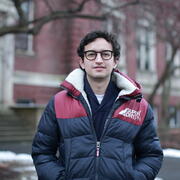
Ph.D Harvard University, Earth & Planetary Sciences
Peter, what are your research interests, and what draws you to the field of energy/climate change research?
I mainly am interested in implications of regional climate change on people and how we can try to reduce some of the major consequences by decarbonizing our energy system. Climate change is one of, if not the most pressing and global issues of this century. I am excited by energy and climate change research because it offers the real possibility to help understand the scope of the climate crisis and offer solutions that could be implemented to mitigate these issues. There is so much left to learn in these fields, which means that scientists can keep providing immediately impactful information. I view research on energy and climate change as an important responsibility and undertaking, and hope that I can inspire other young people to offer their perspectives, as well.
Can you give our community a brief overview of some of your current research projects that you are working on, as you begin your postdoc with the Harvard-China Project?
I will be continuing on with much of the research I have worked on over my PhD. We are particularly focused on means of decarbonizing the electricity sector as well as some of the harder-to-abate sectors, and have a few projects in mind that aim to follow up on the past research we have done on India’s electricity sector and green hydrogen. I am also interested in projects focusing on the intersection of climate and energy, and am currently working on a smaller project looking at the impacts of climate change on future air conditioning demand (and the consequent impacts on the electricity grid because of it).
Where do you envision yourself professionally in 5 or 10 years?
That is largely up in the air for me! I know that I want to continue research on the intersection of climate and energy, though I’m not entirely sure through what medium, whether that be as a professor for an academic institution or research scientist for a national lab.
How has the Harvard-China Project thus far aided your research?
The Harvard-China Project has been enormously helpful in my development as a researcher. The group as a whole is fantastic because there are experts from all sorts of fields, from climate, to atmospheric chemistry to energy systems planning. This fosters an environment that is incredibly intellectually stimulating, where conversations in group meetings can quickly lead to major cross-disciplinary projects. We never run out of things to research!
What has been the best part of your time at Harvard so far? Any memorable experiences?
I have found my whole time at Harvard highly enriching, with countless memorable experiences with the China Project group and with the Department of Earth and Planetary Sciences and the Graduate School of Arts and Sciences, as well. I am perhaps most grateful for the opportunities to mentor Harvard undergraduate students and students from a local high school, allowing me to give back to a community that has given me so much. Giving younger people the opportunity to learn about (and occasionally struggle with!) research has helped me refine my pedagogical but also scientific perspectives in ways I did not envision when I started mentoring. From these experiences, I have learned how to better synthesize and present research in ways that can more easily “stick” with people learning about the science of climate change.
